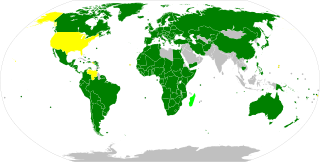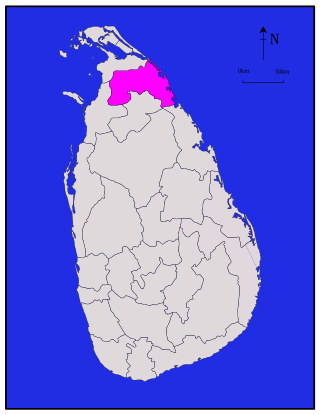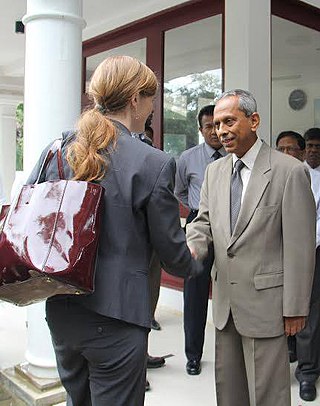Related Research Articles

Hans Axel Valdemar Corell is a Swedish lawyer and diplomat. Between March 1994 and March 2004 he was Under-Secretary-General for Legal Affairs and the Legal Counsel of the United Nations. In this capacity, he was head of the Office of Legal Affairs in the United Nations Secretariat.
There is no universal agreement on the legal definition of terrorism, although there exists a consensus academic definition created by scholars.
Peter Tomka is a Slovak judge of the International Court of Justice. Prior to his election to the ICJ in 2003, Tomka was a Slovak diplomat.

The United Nations General Assembly Sixth Committee is one of six main committees of the General Assembly of the United Nations. It deals primarily with legal matters and is the primary forum for the consideration of international law and other legal matters concerning the United Nations.

The Protocol Relating to the Status of Refugees is a key treaty in international refugee law. It entered into force on 4 October 1967, and 146 countries are parties.
Guy Serle Goodwin-Gill is a barrister and a professor of public international law at Oxford University and a Fellow of All Souls College, Oxford.

Mullivaikal Hospital was a makeshift hospital located in the Safe Zone in northern Sri Lanka. An alleged series of shellings and aerial attacks began on 23 April 2009 when the Mullivaikal Hospital was hit by three artillery shells. It continued on 28 and 29 April when the Mullivaikkal Primary Health Center was hit multiple times over a two-day period with six killed and many injured including one medical staffer. On the 29th and the 30th the Mullivaikal Hospital was again hit multiple times with nine more killed and fifteen injured. There were two attacks against the Mullivaikal Hospital on 2 May, one at 9 a.m. and a second at 10.30 a.m. resulting in sixty-eight killed and eighty-seven wounded, including medical staffers. On the morning of 12 May 2009 it was hit by an artillery mortar, killing at least forty-nine patients and injuring more than fifty others. All of these attacks were allegedly by the Sri Lankan Army; however, the Sri Lankan Government denied the allegation stating there is no evidence.
Lt. Colonel Daya Perera, PC was a Sri Lankan diplomat and lawyer, who was the Sri Lankan High Commissioner to Canada and Ambassador to the United Nations in New York City.
Chitta Ranjan De Silva, PC was a Sri Lankan lawyer. He was Attorney General and Solicitor General of Sri Lanka. He was the Chairman of the Lessons Learnt and Reconciliation Commission.
Sir Michael Charles Wood is a member of the International Law Commission. He was the principal Legal Adviser to the Foreign and Commonwealth Office between 1999 and 2006. During 35 years as a lawyer in the FCO, he attended many international conferences, including the United Nations Conference on the Law of the Sea. He now practices as a barrister from chambers at 20 Essex Street, in London.
The Nuclear Terrorism Convention is a 2005 United Nations treaty designed to criminalize acts of nuclear terrorism and to promote police and judicial cooperation to prevent, investigate and punish those acts. As of October 2022, the convention has 115 signatories and 120 state parties, including the nuclear powers China, France, India, Russia, the United Kingdom, and the United States. Most recently, Oman ratified the convention on 21 October 2022.
The Terrorist Financing Convention is a 1999 United Nations treaty designed to criminalize acts of financing acts of terrorism. The convention also seeks to promote police and judicial co-operation to prevent, investigate and punish the financing of such acts. As of October 2018, the treaty has been ratified by 188 states; in terms of universality, it is therefore one of the most successful anti-terrorism treaties in history.
The Terrorist Bombings Convention is a 1997 United Nations treaty designed to criminalize terrorist bombings.

Ajith Perera is a Sri Lankan politician and former member of Parliament, who commenced his political career as a member of the Provincial Council of the Western Provincial Council in 2009. A lawyer by profession, he was first elected to the Parliament of Sri Lanka in 2010 as a member of the United National Party from the Kalutara District. He was re-elected to the Parliament in 2015. But defeated in 2020.
The Lessons Learnt and Reconciliation Commission was a commission of inquiry appointed by Sri Lankan President Mahinda Rajapaksa in May 2010 after the 26-year-long civil war in Sri Lanka to function as a Truth and reconciliation commission. The commission was mandated to investigate the facts and circumstances which led to the failure of the ceasefire agreement made operational on 27 February 2002, the lessons that should be learnt from those events and the institutional, administrative and legislative measures which need to be taken in order to prevent any recurrence of such concerns in the future, and to promote further national unity and reconciliation among all communities. After an 18-month inquiry, the commission submitted its report to the President on 15 November 2011. The report was made public on 16 December 2011, after being tabled in the parliament.
The Report of the Secretary-General's Panel of Experts on Accountability in Sri Lanka was a 2011 report produced by a panel of experts appointed by United Nations Secretary-General (UNSG) Ban Ki-moon to advise him on the issue of accountability with regard to any alleged violations of international human rights and humanitarian law during the final stages of the Sri Lankan Civil War. The report is referred to by some as the Darusman Report, after the name of the chairman of the panel.

Hewa Matara Gamage Siripala Palihakkara is a Sri Lankan civil servant, diplomat and former Governor of Northern Province.
Reactions to the end of the Sri Lankan Civil War on 18 May 2009 have generally been positive and welcoming, while some countries expressed concern over the civilian casualties and the humanitarian impact.
The United Nations Audiovisual Library of International Law is a free online international law research and training tool. It was created and is maintained by the Codification Division of the United Nations Office of Legal Affairs as a part of its mandate under the United Nations Programme of Assistance in the Teaching, Study, Dissemination and Wider Appreciation of International Law.
The Office on Missing Persons (OMP)' is a Sri Lankan government department tasked with bringing closure to suffering victims and their relatives by determining the status of all missing persons in Sri Lanka. It is the first pillar of four "Transitional Justice mechanisms" proposed by the Sirisena–Wickremesinghe administration in the aftermath of the Sri Lankan Civil War. The Office On Missing Persons Act, No. 14 of 2016 provides for:
"...the establishment of the office on missing persons; to provide for the searching and tracing of missing persons; to provide assistance to relatives of missing persons; for the setting up of a database of missing persons; for setting out the procedures and guidelines applicable to the powers and functions assigned to the said office; and to provide for all matters which are connected with or incidental to, the implementation of the provisions of this act.